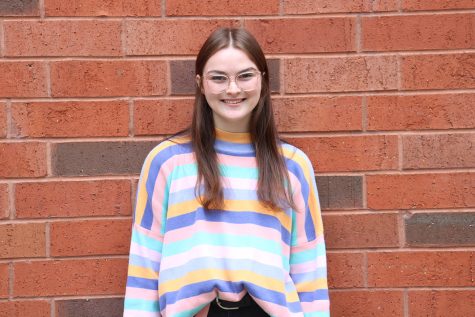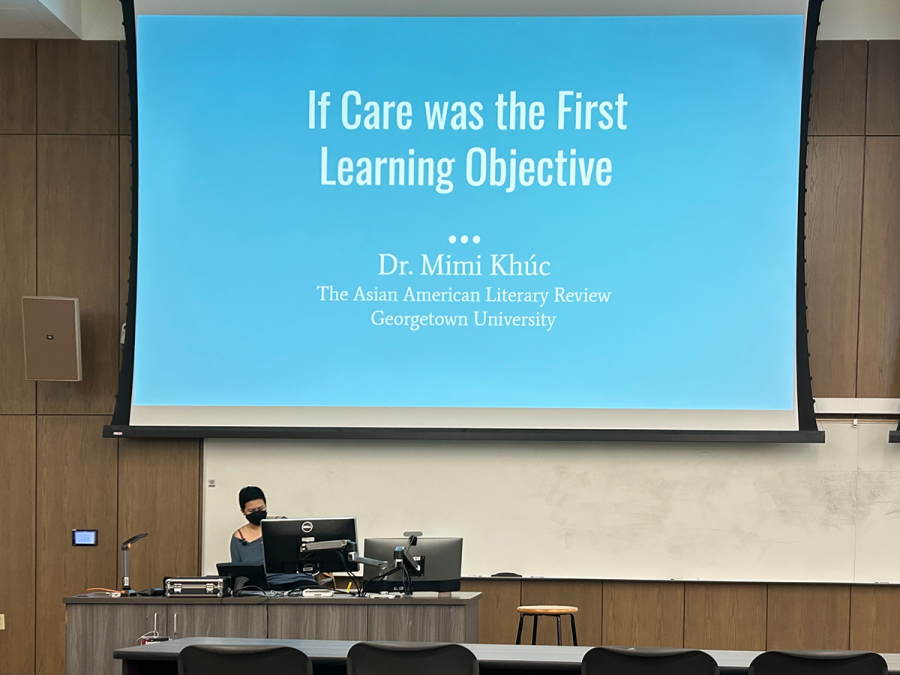Mimi Khúc speaks for International Women’s Day
Guest lecturer presents ‘If Care was the First Learning Objective’
Photo by Mary Allessi
Mimi Khúc presented for International Women’s Day.
Mimi Khúc, a disability studies lecturer at Georgetown University, gave a lecture on building care into education for International Women’s Day on March 9.
After teaching in higher education for over a decade, Khúc said she noticed a common thread among students: burnout.
“I’ve now met with thousands of students, teachers, scholars, writers, artists, mental health professionals, community organizers and university administrators all wanting to figure out why life feels unlivable, especially for BIPOC students,” Khúc said.
According to Khúc, classrooms revolve around the idea of compulsory wellness. Students are expected to adhere to the normative personhood constructed by the school system to ensure productivity.
“Ableism isn’t simply discrimination against disabled folks,” Khúc said. “It is the construction of ideal personhood and the devaluation of those who deviate from that personhood. It is pathologizing that deviation and demanding its eradication.”
Khúc said she urges these institutions to evaluate the role they have played in contributing to student unwellness.
“Students have been electrified by these conversations and the insistence that they matter,” Khúc said. “The stakes are really, horrifically high, whether educators know that or not.”
The expectation to do well at all costs is costing students their mental wellness and leads to feelings of exhaustion, helplessness and isolation, Khúc said.
“There is this pressure to perform and signify that you are normal. It is what I call compulsory wellness,” Khúc said. “It is a contempt and denial of needs.”
Care and accessibility should be built into classrooms, according to Khúc. Students should feel like they matter, can engage meaningfully and belong. She calls this framework the pedagogy of unwellness.
“We are all differentially unwell. We need differential care at all times,” Khúc said. “There is no neutral possibility, just like how there is no neutral or universal student.”
“I felt heard listening to Dr. Khúc’s lecture,” said Allison Pokrandt, a second-year social work student. “I want to see UW-Eau Claire implement care at a higher level, opposed to just leaving it up to each individual professor.”
According to Khúc, teaching is a transformative care process and accessibility should be embedded into schooling, rather than granted exclusively to those who are “unwell enough.”
“What if access is about the ability to participate as fully as possible? What if accommodations were not exceptions to a rule, but a constant negotiation of needs and supports as a collective?” Khúc said. “What if care was not individual, but structural?”
Care is labor and faculty are already overburdened, according to Khúc. So how do faculty members implement care if they don’t have energy or resources left to give?
“We are burnt out, but our students are burnt out too. They are also doing all of their academic work at the cost of their own health,” Khúc said. “So, let’s be burnt out together.”
Students have the power, according to professor Kong Phang Pah, an associate professor of critical Hmong studies and Women, Gender and Sexuality Studies.
“It can feel daunting, but students can demand resources that they need from the university,” Pah said. “Since the pandemic, student mental unwellness has been at an all-time high. Dr. Khúc is a renowned scholar and we felt like she could highlight these issues for students.”
It is important to validate and trust students, according to Khúc. If teaching focuses less on the quantity and speed of distributing information, and more on knowledge production, students and teachers can take co-ownership of the education process.
“The classroom is a space to wrestle with concepts, sometimes in surprising ways, and not always requiring a clear endpoint,” Khúc said. “I encourage vulnerability and build trust with students by acknowledging that their lives are hard.”
Khúc’s upcoming novel “dear elia: Letters from the Asian American Abyss” will be published in March 2024.
Allessi can be reached at [email protected].

Mary Allessi is a third-year English secondary education student and this is her third semester on the Spectator. Outside of class, she loves making collages, journaling and talking to her mom on FaceTime.











